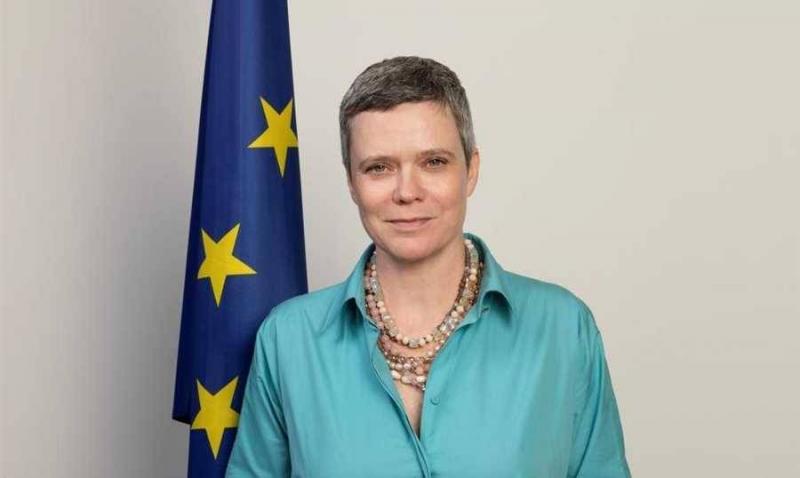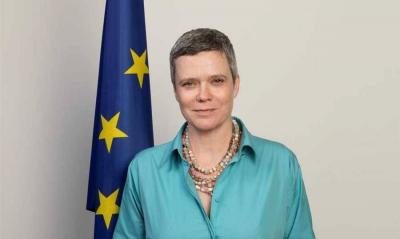The EU mission in Lebanon distributed a speech by EU Ambassador Sandra Duval on the occasion of “Europe Day.” She said: “Thank you for sharing this special occasion with us. We would have liked to celebrate Europe Day in the presence of all our partners and friends in the country, but the celebration is not feasible in these challenging times for Lebanon and the region. Nevertheless, I wanted to commemorate this day, and I believe it is appropriate to do so specifically while reflecting on the peace-building project that the EU had and still has. The European Union was established after two brutal wars that claimed millions of victims and tore our continent apart. No one expected in 1945 that the countries that sought to destroy each other would eventually form a strong economic and political union. Yet they did, as the European project of peace-building was born from a strong determination to prevent war on our continent, making war ‘not only unthinkable but materially impossible,’ as stated in the Schuman Declaration.”
She added, “This project remains valid today as it has always been. It gives us hope that peace can be achieved. Moreover, peace is essential; it is the foundation for a more prosperous and stable future. In this corner of the world, the only viable solution that can bring peace for the Palestinians, security for Israelis, and stability for the Middle East is the two-state solution.”
She continued, “In the past few months, we have closely followed the tragic conditions in Gaza and Southern Lebanon, and we have used all diplomatic channels to call for an end to hostilities and humanitarian suffering. Lebanon has been on the front lines of this war since October 8. Lebanon cannot bear to be dragged further into this conflict. We must continue working to mitigate the conflict and reach a diplomatic settlement in the south. In this context, I reiterate our call for the full implementation of United Nations Security Council Resolution 1701 by all parties.”
She stated, “The war in the south has only exacerbated the already fragile situation in Lebanon. There has been no significant progress in placing Lebanon on the path to economic recovery. The decision-making process remains paralyzed in the absence of a president and with a caretaker government. In this context, European Commission President Ursula von der Leyen visited Beirut last week to announce a €1 billion package to support Lebanon. This new package is a political commitment that the EU will provide predetermined financial support to Lebanon through 2027.
She explained, “The package will allow us to continue funding key sectors such as social protection, health, water, and education, and to support the government in providing essential services for the most vulnerable in the country. This includes not only Syrian refugees but also many Lebanese who benefit from EU-funded social assistance programs, affordable primary healthcare services, clean water access, or newly rehabilitated public schools. In fact, the bulk of this support directly benefits Lebanese citizens. With this package, we will continue to support these key sectors, in close coordination with the Lebanese government.”
She added, “We are not deaf; we hear and clearly understand the concerns raised by Lebanese people regarding the presence of such a large number of Syrians. We also acknowledge the heavy burden resulting from this situation. The EU sees that the future of Syrians lies in Syria. The safe return of Syrians to Syria remains our ultimate goal, and we hope to work together in a constructive manner to make this a reality. Therefore, we will invest further in legal pathways for refugees so that they can find employment opportunities in Europe. For this reason, we will continue to resettle refugees from Lebanon to Europe to help ease the burden.
She continued, “In the coming months, we will also work with the Refugee Commission to develop a more organized approach to voluntary returns to Syria. In this context, we will support the Lebanese army, the General Security, and internal security forces by providing them with the necessary equipment and expertise to better manage the Lebanese land and sea borders. We also look forward to working with our Lebanese partners to find a solution to this issue. We understand how important this matter is. However, we all must be realistic in acknowledging that this process will take time. It will require the cooperation of more parties, alongside Lebanon and Europe.”
She concluded, “Europe's relations with Lebanon did not begin in 2011 with the Syrian crisis, nor will they end with it. They did not start with the opening of the first EU mission in Lebanon in 1979. What connects us is much stronger. It is the history and culture we share. It is the essence of the Mediterranean and its flavors, the familiar landscapes, the diversity of languages and religions, and the sense of freedom that we all experience here. We are as determined as you are to ensure that these connections endure.”




